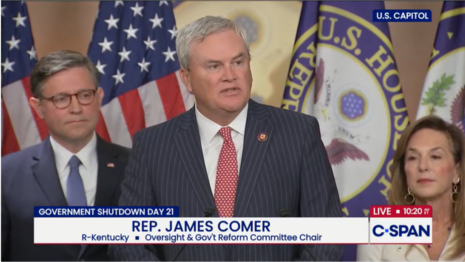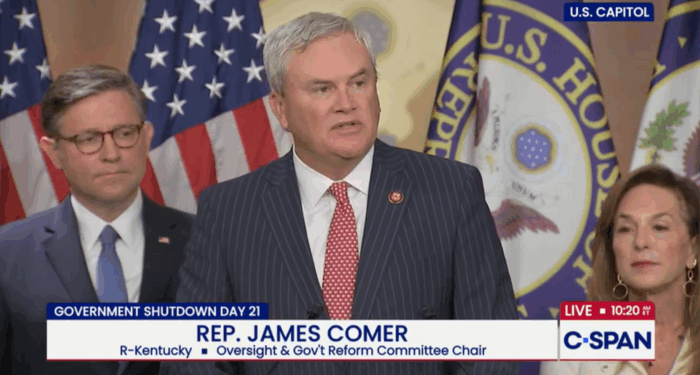 The Republican-led House Oversight Committee issued a report on its investigation of how Biden’s White House aides hid his mental decline. ABC, CBS, and NBC aired nothing. PBS offered a dismissive brief. How about NPR’s All Things Considered? You won’t believe what they considered.
The Republican-led House Oversight Committee issued a report on its investigation of how Biden’s White House aides hid his mental decline. ABC, CBS, and NBC aired nothing. PBS offered a dismissive brief. How about NPR’s All Things Considered? You won’t believe what they considered.
Chairman James Comer summarized: “The Biden Autopen Presidency will go down as one of the biggest political scandals in U.S. history. As Americans saw President Biden’s decline with their own eyes, Biden’s inner circle sought to deceive the public, cover-up his decline, and took unauthorized executive actions with the autopen that are now invalid.”
There was an NPR segment lasting 4.5 minutes. But it never mentioned any of the Republican findings. They only interviewed an expert to explain the Republicans couldn’t possibly reverse any pardons Biden signed with an autopen! They were only concerned that Biden’s pardons remain valid, and who cares about Biden’s incapacity to be president?
Anchor Ailsa Chang barely mentioned Congressman Comer, which is very much an NPR pattern. Not only has NPR failed to interview Comer, a look at the search engine on NPR.org finds more results for English actress Jodie Comer.
I found two James Comer results. You can find a story from December 15, 2023 that sounded like DNC opposition research. On Morning Edition, they interviewed AP reporter Brian Slodysko, who claimed Comer had a shell company, just like Hunter Biden. Comer called that story financially illiterate. NPR host Leila Fadel cued up the AP man: “The big takeaway in your story is that the accusations that are being leveled against President Biden’s son are very similar to what you’ve reported on Comer. If you could, talk about that.”
The only other search result is a James Comer interview in 2017 about the firing of James Comey – that can get confusing.
In the latest report, Comer was mentioned in passing as anchor Ailsa Chang interviewed Minnesota law professor Mark Osler, who penned an op-ed last year promoting Gov. Tim Walz to be Kamala Harris’s running mate. Don’t miss the part where Chang feels she must underline this is a “Republican-led committee,” so NPR fans can roll their eyes:
NPR’s All Things Considered
October 28, 2025
AILSA CHANG: So this House Oversight Committee accuses the Biden White House of covering up Biden’s cognitive decline. Let me just ask you, what does this report ultimately ask for?
MARK OSLER: Well, it’s asking for a further investigation by the Department of Justice. I think they were frustrated because some of the witnesses pled the Fifth. And there’s a political point being made as well.
CHANG: OK. And just to remind everyone, this is a Republican-led committee. What do you make of the argument that they lay out in this report about Biden’s cognitive decline and the permanence of these preemptive pardons?
OSLER: Yeah. I’m not an expert on cognition, but I am an expert on clemency, and I can tell you that the Constitution doesn’t make any requirement whatsoever as to how a pardon or a commutation is going to be put into writing or issued at all. And we’ve seen a variety of methods used over the years. You know, in 2005, the Office of Legal Counsel provided the president with advice that the president could use an autopen to sign bills – obviously one of the most important things the president is going to sign. And since then, presidents have used autopens for a wide variety of things…
CHANG: Right.
OSLER: …Especially when there’s a lot to be signed at once.
CHANG: Well, what can the Department of Justice actually do in this situation? Like, can you think of anytime a pardon from a president has been reversed or declared null and void, as this House committee and President Trump would like to see happen here?
OSLER: No, that hasn’t happened. Once a president issues a pardon, it’s been viewed as final. And so if something was to get overturned here, this would really be breaking new ground.
CHANG: So are you telling me that a president’s pardon power is absolute?
OSLER: It’s surprising, but that’s what it says in the Constitution. It’s almost absolute. It can’t cover people who are under impeachment, and it’s generally accepted that it can’t pardon future crimes, those that haven’t been committed yet. But yes. It’s really rare in having so few checks and balances.
CHANG: Well, then, okay. Say you’re a person who did receive a pardon from President Biden. What would you advise that person to do to protect themselves legally now from having that pardon reversed or somehow invalidated during the Trump administration?
OSLER: Yeah. There’s really not that much that they can do. Again, I think most people who have studied this would be shocked if a pardon was overturned. One of the things that I really fear that could happen with this investigation and some of the conclusions that they seem to want to reach is you have 37 people who received a commutation of their death sentence by President Biden. And I would really think it would cause a constitutional crisis if President Trump moved to execute those people despite that commutation of the death sentence. But going forward, I hope that pardons aren’t undermined. They’re under enough stress as they are.
CHANG: Mark Osler, from the University of St. Thomas, thank you very much for being with us today.
















